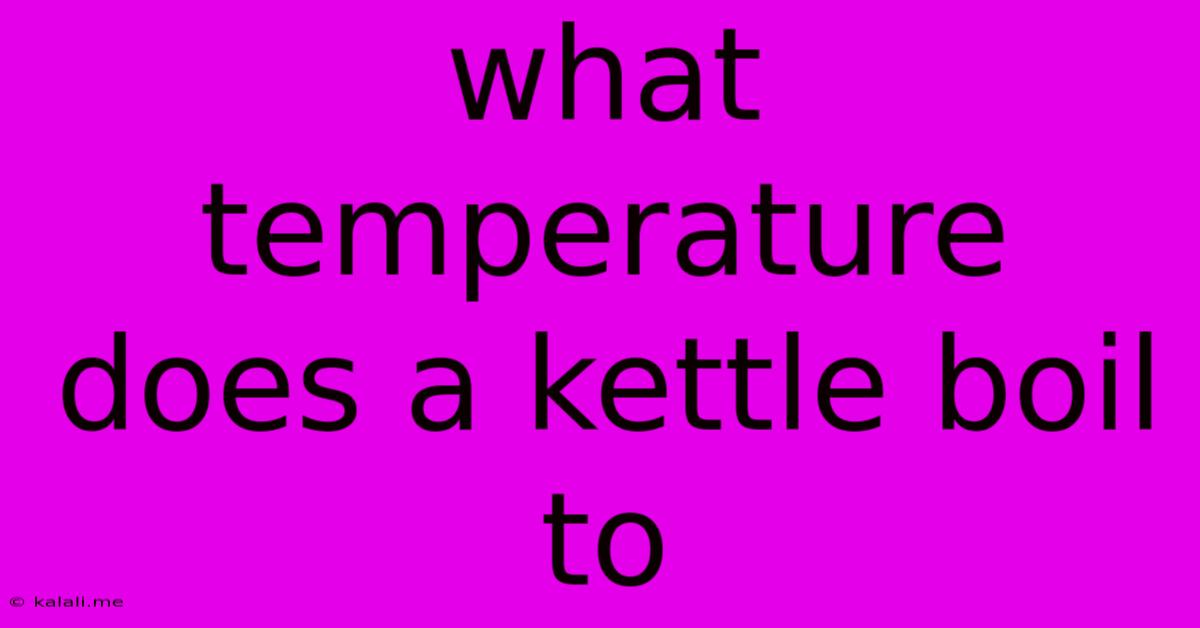What Temperature Does A Kettle Boil To
Kalali
May 19, 2025 · 3 min read

Table of Contents
What Temperature Does a Kettle Boil To? A Deep Dive into Boiling Points
Meta Description: Discover the exact boiling point of water in a kettle and learn about factors that can slightly affect this temperature. We explore the science behind boiling and dispel common misconceptions.
Water boils. It's a simple fact of life, yet the precise temperature at which this seemingly simple process occurs can be surprisingly nuanced. This article will clarify the boiling point of water in a kettle and explore the factors that might influence it.
The Standard Boiling Point of Water
Under standard atmospheric pressure (1 atmosphere, or 101.325 kPa), water boils at 100 degrees Celsius (212 degrees Fahrenheit). This is the temperature at which the vapor pressure of the water equals the atmospheric pressure surrounding it, allowing the water to transition from a liquid to a gas (steam). This is the temperature you'll typically see on a kettle's thermometer, assuming the kettle is working correctly and your location has standard atmospheric pressure.
Factors Affecting Boiling Point
While 100°C is the standard, several factors can subtly alter the boiling point of water in your kettle:
-
Altitude: At higher altitudes, atmospheric pressure is lower. This means water boils at a lower temperature. For instance, at the top of Mount Everest, water boils at around 70°C. If you live in a mountainous region, you might find your kettle boils slightly below 100°C.
-
Impurities: Dissolved minerals and other impurities in the water can slightly elevate the boiling point. This effect is usually minimal in most tap water but can be more noticeable with highly mineralized water. Hard water, for example, may have a slightly higher boiling point than pure distilled water.
-
Kettle Material and Design: The type of kettle and its design can also play a tiny role. Different materials conduct heat differently, and the design of the heating element can influence the rate of heat transfer. However, these factors generally don't significantly change the boiling point itself; rather they influence how quickly the water reaches that point.
-
Amount of Water: While the amount of water doesn't directly alter the boiling point, a larger volume of water will take longer to reach 100°C than a smaller volume.
Why Understanding Boiling Point Matters
Knowing the boiling point of water is crucial for various tasks, from cooking to understanding scientific principles. In the context of a kettle, it helps ensure the water is hot enough for your desired beverage, while understanding the factors that affect boiling point can help troubleshoot issues with a malfunctioning appliance.
Dispelling Common Myths
It's important to dispel a common misconception: boiling water longer does not make it hotter. Once the boiling point is reached, increasing the heat only increases the rate of vaporization (steam production), not the temperature of the water itself.
Conclusion
While the standard boiling point of water in a kettle is 100°C (212°F), minor variations are possible due to factors like altitude and water purity. Understanding these factors provides a more complete picture of the boiling process and can help you better understand the performance of your kettle and the science behind a seemingly simple everyday occurrence.
Latest Posts
Latest Posts
-
How To Tell If Mozzarella Is Bad
May 20, 2025
-
Fallout New Vegas Power Armour Training
May 20, 2025
-
Best Lubricant For Squeaky Door Hinges
May 20, 2025
-
Telephone Code For Italy From Uk
May 20, 2025
-
The Previous Month As Used In Formal Correspondence
May 20, 2025
Related Post
Thank you for visiting our website which covers about What Temperature Does A Kettle Boil To . We hope the information provided has been useful to you. Feel free to contact us if you have any questions or need further assistance. See you next time and don't miss to bookmark.